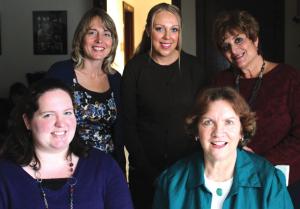Mercyhurst College has been ranked by “Best Colleges Online” as one of “20 Incredible Colleges for Special Needs Students” and “10 Impressive Special College Programs for Students with Autism.”
Ranked with universities such as Arizona, Iowa and West Virginia, Mercyhurst was ranked ninth for its Learning Differences (LD) program. The LD program is celebrating 25 years of helping students with special needs to be better equipped in the classroom.
 Sarah Hlusko photo: In the front row are Rebecca Ruch and Elaine Ruggiero. In the back row are Lori Kaveney, Christina Jenkins and Dianne Rogers. The staff is a huge support for special needs students.
Sarah Hlusko photo: In the front row are Rebecca Ruch and Elaine Ruggiero. In the back row are Lori Kaveney, Christina Jenkins and Dianne Rogers. The staff is a huge support for special needs students.
“The students accessing our program are people with learning disabilities: attention deficit disorder, traumatic brain injuries, post-traumatic stress disorder and Asperger Syndrome,” Director of Learning Differences Dianne Rogers said.
The number of students in the program are growing.
“When I started here in ’98, there were 30 students in the LD Program. Now there are over 200,” Rogers said.
The program provides academic support through tutoring, mentoring, note-taking and counseling, as well as social opportunities such as networking with other students.
“We have a lot of interested prospective students, but we have a strict selection process,” said Rogers. “Not only do they need to meet the standards of the institution, they also must interview with me, and then we select 20 students.”
Not only was the school ranked for its LD Program, it was also awarded third place for its Asperger Initiative Program, a subset of LD, which was ranked among Drexel, Rutgers and Boston universities.
“Asperger Syndrome is the mildest form of autism,” said Rogers. “Over the years, autism has become known as a spectrum disorder, and we are attracting students at this highest end of the spectrum.”
The Asperger Initiative at Mercyhurst (AIM) began in the late 2000s after an article in 2003 proposed a large number of students with autism would be heading for colleges and universities in the coming years. The program was greatly influenced by Associate Professor Ken Schiff, Ph.D., who had prior dealings with people with Asperger.
“There were no models for us to use because it was so new,” said Schiff. “Even now, there are not more than 20 really structured programs out there.”
While the program is one of a kind, Rogers said it’s not about the program but the students they are helping.
“It’s been a great success, but like with any new initiative, there are growing pains,” said Rogers.
“We’ve learned a lot, and we are trying to use those to make the program stronger and continue to improve it.
“There are different ways to evaluate the program,” said Rogers. “The role of the program and the place of student conduct have to be kept tightly together because being quirky and having unusual behaviors don’t mean that you have the right to break school laws and put yourself and other students at risk.”
Director of Residence Life Alice Agnew agreed that AIM students need to be held to the same standard as all students.
“If a student is seen to violate a rule and is documented for the behavior, it will be addressed through student conduct,” said Agnew.
Ultimately it’s about getting the students in the program ready for the real world.
To do this, “We are talking about hiring some job coaches to train the students for interviews. People who don’t interview well, people who don’t make eye contact, people who twitch—they’re not going to get a job, especially with all the people out there looking for jobs,” Rogers said.
Overall, Rogers says the program has put the school on the map.
“There have been rough patches, but I look at other programs in comparison to ours, and we not only have great students, but we provide them with an opportunity to get a degree and have a great time doing it,” said Rogers. “Some of the situations that we’ve had to deal with have made me less tolerant, but while we may have a problem with one student, there are three more that are doing great and succeeding.”
Junior Paige Bosnyak commented on having the LD program at the college. “It adds diversity and a great support system to Mercyhurst,” she said.
Junior Maura Hunter agreed. “It’s more than just a program; it’s a community thing,” she said.
Rogers attributes much of the success to the administration for its support of the program.
“A lot of our success has been aided by President Gamble and Dr. Tobin, both of whom are trained psychologists and see the importance in these things,” said Rogers. “They have helped us, supported us and were sympathetic to the mission.”
Vice President of Student Life Gerard Tobin, Ph.D., said, “The program just felt like a mission-appropriate thing to do,” he said. “It fit our identity.”
Tobin said that the program has come a long way to reach its current form, and now all there is to do is wait.
“We’ve created the program, now we need to cycle it through a couple times and solidify it,” he said.
